
Puzzle Bobble, internationally known as Bust-A-Move, is a 1994 tile-matching puzzle arcade game developed and published by Taito. It is based on the 1986 arcade game Bubble Bobble, featuring characters and themes from that game. Its characteristically cute Japanese animation and music, along with its play mechanics and level designs, made it successful as an arcade title and spawned several sequels and ports to home gaming systems.
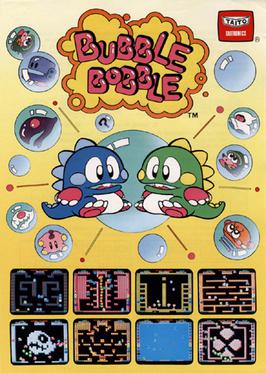
Bubble Bobble is a 1986 platform game developed and published by Taito for arcades. It was distributed in the United States by Romstar, and in Europe by Electrocoin. Players control Bub and Bob, two dragons that set out to save their girlfriends from a world known as the Cave of Monsters. In each level, Bub and Bob must defeat each enemy present by trapping them in bubbles and popping, who turn into bonus items when they hit the ground. There are 100 levels total, each becoming progressively more difficult.
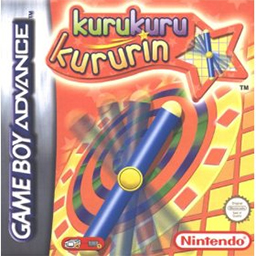
Kuru Kuru Kururin is a puzzle video game developed by Eighting and published by Nintendo for the Game Boy Advance (GBA). It was released in Japan on March 21, 2001, and in Europe and Australia on June 22 as a launch title. It was not released in North America until February 2016 via the Wii U's Virtual Console service. Kuru Kuru Kururin is the first title in the Kururin series and was followed by two Japan-only sequels, Kururin Paradise and Kururin Squash!. The game was released on the Nintendo Switch Online + Expansion Pack in February 2023.

Qix is a 1981 puzzle video game developed by husband and wife team Randy and Sandy Pfeiffer and published in arcades by Taito America. Qix is one of a handful of games made by Taito's American division. At the start of each level, the playing field is a large, empty rectangle, containing the Qix, an abstract stick-like entity that performs graceful but unpredictable motions within the confines of the rectangle. The objective is to draw lines that close off parts of the rectangle to fill in a set amount of the playfield.
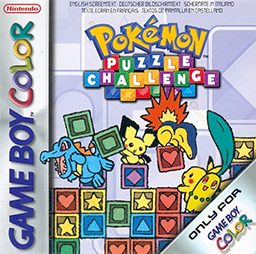
Pokémon Puzzle Challenge is a puzzle video game developed by Intelligent Systems and published by Nintendo for the Game Boy Color. Released in Japan on September 21, 2000; in North America on December 4, 2000; and in PAL regions on June 15, 2001, it is the second Pokémon-themed entry in the Puzzle League series. While its Nintendo 64 counterpart Pokémon Puzzle League is visually based on the Pokemon anime, Puzzle Challenge instead draws inspiration from the Pokémon Gold and Silver games. The game features multiple modes of play and support for competitive play between two players. Puzzle Challenge was later digitally re-released via the Nintendo 3DS's Virtual Console line on November 6, 2014.

Wetrix is a 3D puzzle video game developed by Zed Two, the studio of brothers Ste and John Pickford, for the Nintendo 64 and personal computers in 1998, and the Dreamcast and Game Boy Color in 1999. The player's goal is to hold water bubbles falling on a 3D isometric landscape. To do this, enclosures are created with Uppers, which fall in a similar manner to Tetris blocks, that raise the ground. While water can be evaporated with fireballs, hazards such as Mines, Ice Cubes, and earthquakes also fall and ruin the player's construction.
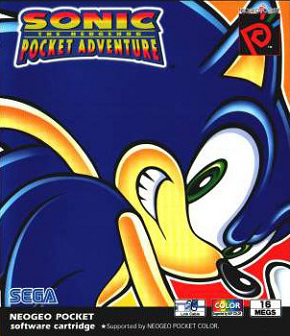
Sonic the Hedgehog Pocket Adventure is a platform game developed and published by SNK for the Neo Geo Pocket Color in 1999. The game is based on Sonic the Hedgehog 2 (1992) for the Sega Genesis, borrowing much of the stage themes and gameplay elements, but featuring unique stage layouts, elements from other Genesis Sonic the Hedgehog games, and extra game modes. Sega's Yuji Naka and the rest of Sonic Team supervised over production.

Mole Mania is a 1996 video game developed and published by Nintendo for the Game Boy. It was released in Japan in July 1996, North America in February 1997 and Europe in May 1997. The game was re-released for the Nintendo 3DS Virtual Console in all major regions throughout 2012.

Pac-Attack, also known as Pac-Panic, is a 1993 falling-tile puzzle video game developed and published by Namco for the Super Nintendo Entertainment System and Sega Genesis. Versions for the Game Boy, Game Gear and Philips CD-i were also released. The player is tasked with clearing out blocks and ghosts without them stacking to the top of the playfield — blocks can be cleared by matching them in horizontal rows, while ghosts can be cleared by placing down a Pac-Man piece that can eat them. It is the first game in the Pac-Man series to be released exclusively for home platforms.

Puzzle Bobble 2 is a tile-matching video game by Taito. The first sequel to Puzzle Bobble, it is also known in Europe and North America as Bust-A-Move Again for arcades and Bust-A-Move 2: Arcade Edition for home consoles. Released into the arcades in 1995, home conversions followed for the PlayStation, Sega Saturn, Nintendo 64, and Windows platforms. The game was included in Taito Legends 2, but the US arcade version was included in the US PS2 version instead. Further ports for the Nintendo Switch, PlayStation 4, and Xbox One were released by City Connection alongside Puzzle Bobble 3 in February 2023.
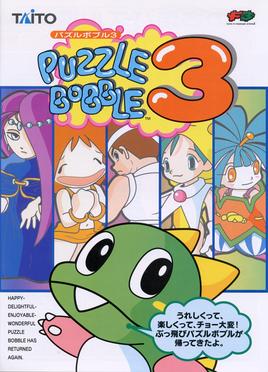
Puzzle Bobble 3 is an action puzzle video game developed by Taito. The second sequel to Puzzle Bobble, it was released for arcades in September 1996 and later ported to the Sega Saturn, PlayStation, Game Boy, Nintendo 64 and Microsoft Windows. Like its predecessors, the player is tasked with shooting balls at groups of balls, creating groups of three or more, which are then removed from play. Further ports for the Nintendo Switch, PlayStation 4 and Xbox One were released in February 2023 by City Connection alongside Puzzle Bobble 2.
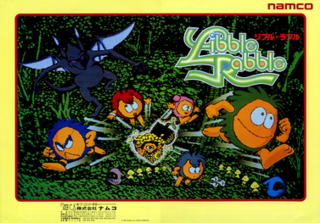
Libble Rabble is a 1983 puzzle arcade video game developed and published in Japan by Namco. The player is tasked with using two colored arrows, Libble and Rabble, to wrap them around pegs and surround small creatures known as Mushlins to "harvest" them under a time limit. The player can also uncover treasure chests that will have the player searching the stage for items in order to access a special bonus stage. It ran on the Namco Libble Rabble hardware, one of the only games to do so.

Kollon (ころん) is a 2003 Arcade puzzle game developed by MagicPot and published by CyberFront. Kollon was later ported to the PlayStation Portable as a launch title in 2004.

Bionicle Heroes is a 2006 video game published by Eidos Interactive and TT Games Publishing and based on Lego's Bionicle line of constructible action figures. The game was released in November 2006 on PlayStation 2, Xbox 360, GameCube, Microsoft Windows, Game Boy Advance, and Nintendo DS; a Nintendo Wii version was later released in April 2007. The home console and PC versions were developed by Traveller's Tales, while Amaze Entertainment developed the handheld versions. A version of the game for mobile phones, developed by Universomo, was also released. The home console and PC versions of the game are third-person shooters, while the Game Boy Advance version is a run 'n' gun shoot 'em up and the Nintendo DS version is a first-person shooter. The story of Bionicle Heroes, where the player seeks to liberate the island of Voya Nui and its inhabitants from the villainous Piraka, is not canon to the official Bionicle story.
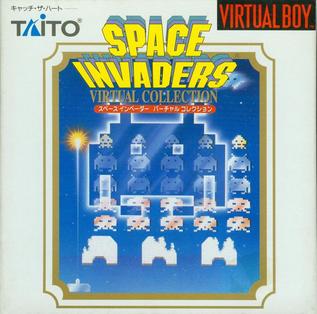
Space Invaders Virtual Collection is a 1995 compilation video game developed and published by Taito in Japan for the Virtual Boy. It includes direct ports of the arcade game Space Invaders (1978) and its sequel Space Invaders Part II (1979), alongside 3D remakes that take advantage of the Virtual Boy's hardware capabilities. Both games feature a number of alternative gameplay modes, such as score attack and time attack.

Kwirk, known in Japan as Puzzle Boy, is a puzzle video game developed and published by Atlus in Japan on November 24, 1989, for the Game Boy. It was the very first video game Atlus released under its own brand. The game was later published in North America in March 1990 by Acclaim Entertainment.
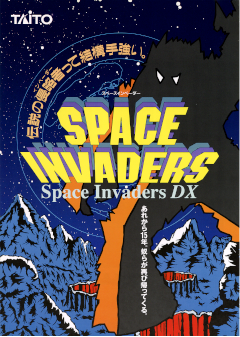
Space Invaders DX is a 1993 fixed shooter arcade game developed and published in Japan by Taito. It has been re-released for several consoles since, including the Super Nintendo Entertainment System, PC Engine Super CD, and Sega Saturn — several of these conversions use the name Space Invaders: The Original Game. The player assumes control of a laser base that must fend off waves of incoming enemies, who march down in formation towards the bottom of the screen. It is the fifth entry in the long-running Space Invaders series. DX contains four variations of the original Space Invaders, in addition to a multiplayer mode and a "Parody Mode" that replaces the characters with those from other Taito franchises. Home ports of DX received mixed reviews for their high price point and general lack of content.

Qix++ is a video game developed and released by Taito for Xbox Live Arcade on December 9, 2009 and the PlayStation Portable on February 25, 2010 exclusively in Japan. It is the fifth game in the Qix series, and adds several new features, such as different Qix types, powerups, and new enemies. The Xbox 360 version of Qix++ was added to the Xbox Backwards compatibility list on September 8, 2016 making it 100% compatible with Xbox One and later, the Xbox Series X and series S. As of December 25, 2021 it was still available to buy on the Xbox Game Store.

Magical Drop III is a 1997 puzzle video game developed and published by Data East for the Neo Geo arcade and home platforms. It was later ported to Sega Saturn, PlayStation, Neo Geo Pocket Color, Game Boy Color, Windows, and Zeebo. It is the third entry in the Magical Drop series. In the game, the player takes control of one of several characters, battling against computer-controlled opponents. Gameplay is similar to previous entries albeit with further additions; the objective is to clear the screen of constantly advancing colored 'drops' via a character placed at the bottom of the playfield, which can grab drops and make them disappear by putting drops as a column of three or more of the same color. The player can also participate in a board-style adventure mode, while two players can play against each other in a competitive versus mode.
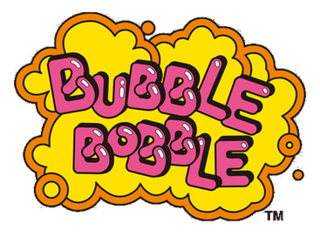
Bubble Bobble is a platform game series originally developed and published by Taito. The first entry in the series, Bubble Bobble, was released in 1986 as an arcade cabinet. In most entries in the series, players control two dragons named Bub and Bob. This was followed by many sequels in both the main Bubble Bobble series, as well as the spin-off Rainbow Islands series. They were published for and ported to a wide variety of arcade and home video game consoles. The most recent release in the series is Bubble Bobble 4 Friends in 2019.





















